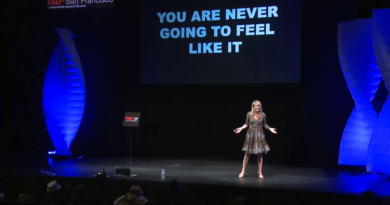Photo by Joshua Earle on Unsplash
Neste vídeo do canal Tech Insider são apresentados alguns fatos inquietantes. Você sabia que os americanos (e provavelmente também os brasileiros) passam mais de sete horas por dia olhando para telas digitais? Esse tempo de tela geralmente leva a visão turva, fadiga ocular e problemas de visão de longo prazo, como miopia. Além disso, as telas emitem luz azul, que interrompe nossos ritmos circadianos à noite quando estamos tentando adormecer. E todo esse tempo de tela pode até mudar nossos cérebros. Um estudo novo e em andamento apoiado pelo NIH – National Institute of Health, descobriu que alguns pré-adolescentes que passavam mais de sete horas por dia nas telas tinham diferenças em partes de seus cérebros em comparação com crianças que passavam menos tempo nas telas.
| Audio | |
|---|---|
Normal | Slow |
| English Transcript | Tradução |
| It's 11 PM. | São 23h. |
| You should be asleep, but you're watching a video on your phone and tomorrow you'll wake up, and go to work, where you'll stare at a computer for eight hours. | Você deveria estar dormindo, mas está assistindo a um vídeo no celular e amanhã vai acordar e ir trabalhar, onde ficará olhando para um computador por oito horas. |
| When you get home, you might even watch a movie on TV. | Quando você chega em casa, pode até assistir a um filme na TV. |
| So if you're anything like the average American adult, you spend more than seven hours a day staring at digital screens. | Então, se você é como o adulto americano médio, passa mais de sete horas por dia olhando para telas digitais. |
| So what's all this screen time actually doing to your body and brain? | Então, o que todo esse tempo de tela está realmente fazendo com seu corpo e cérebro? |
| Surprise, surprise, humans did not evolve to stare at bright electronic screens all day so our eyes are suffering the consequences. | Surpresa, surpresa, os humanos não evoluíram para olhar para telas eletrônicas brilhantes o dia todo, então nossos olhos estão sofrendo as consequências. |
| An estimated 58% of people who work on computers experience what's called computer vision syndrome. | Estima-se que 58% das pessoas que trabalham em computadores experimentam o que é chamado de síndrome da visão computacional. |
| It's a series of symptoms that include eye strain, blurred vision, headaches, and neck and back pain. | É uma série de sintomas que incluem cansaço visual, visão turva, dores de cabeça e dores no pescoço e nas costas. |
| And in the longterm this amount of screen time could be damaging our vision permanently. | E, a longo prazo, essa quantidade de tempo de tela pode prejudicar nossa visão permanentemente. |
| Since 1971, cases of nearsightedness in the US have nearly doubled, which some scientists partly link to increased screen time. | Desde 1971, os casos de miopia nos EUA quase dobraram, o que alguns cientistas associam parcialmente ao aumento do tempo de tela. |
| And in Asia today, nearly 90% of teens and adults are nearsighted. | E na Ásia hoje, quase 90% dos adolescentes e adultos são míopes. |
| But it's not just the brightness of our screens that affect us, it's also the color. | Mas não é apenas o brilho de nossas telas que nos afeta, é também a cor. |
| Screens emit a mix of red, green, and blue light. | As telas emitem uma mistura de luz vermelha, verde e azul. |
| Similar colors to sunlight. | Cores semelhantes à luz solar. |
| And over a millennia it was blue wavelengths in sunlight that helped us keep our circadian rhythms in sync with our environment. | E ao longo de milênios foram os comprimentos de onda azuis da luz solar que nos ajudaram a manter nossos ritmos circadianos em sincronia com nosso ambiente. |
| But since our circadian rhythms are more sensitive to blue light than any others, a problem occurs when we use our screens at night. | Mas como nossos ritmos circadianos são mais sensíveis à luz azul do que qualquer outro, ocorre um problema quando usamos nossas telas à noite. |
| Typically when the sun sets we produce the hormone melatonin. | Normalmente, quando o sol se põe, produzimos o hormônio melatonina. |
| This hormone regulates our circadian rhythms, helping us feel tired and fall asleep. | Este hormônio regula os nossos ritmos circadianos, ajudando-nos a sentir-nos cansados e a adormecer. |
| But many studies have found that blue light from screens can disrupt this process. | Mas muitos estudos descobriram que a luz azul das telas pode atrapalhar esse processo. |
| For example, in one small study, participants who spent four hours reading e-books before bed for five nights, produced 55% less melatonin than participants that read print books. | Por exemplo, em um pequeno estudo, os participantes que passaram quatro horas lendo e-books antes de dormir por cinco noites produziram 55% menos melatonina do que os participantes que leram livros impressos. |
| What's more, the e-book readers reported that they were more alert before bed, took longer to fall asleep and reach restorative REM state, and were more tired the next morning. | Além disso, os leitores de e-books relataram que estavam mais alertas antes de dormir, demoravam mais para adormecer e atingir o estado REM restaurador e estavam mais cansados na manhã seguinte. |
| But perhaps the most concerning changes we're starting to see from all this screen time is in kid's brains. | Mas talvez as mudanças mais preocupantes que estamos começando a ver de todo esse tempo de tela estejam no cérebro das crianças. |
| An ongoing study, supported by the NIH has found that some preteens who clocked over seven hours a day on screens had differences in a part of their brain called the cortex. | Um estudo em andamento, apoiado pelo NIH, descobriu que alguns pré-adolescentes que passavam mais de sete horas por dia nas telas tinham diferenças em uma parte do cérebro chamada córtex. |
| That is the region responsible for processing information from our five senses. | Essa é a região responsável pelo processamento das informações dos nossos cinco sentidos. |
| Usually the cortex gets thinner as we mature, but these kids had thinner cortexes earlier than other kids who spent less time on screens. | Normalmente, o córtex fica mais fino à medida que amadurecemos, mas essas crianças tinham córtex mais fino mais cedo do que outras crianças que passavam menos tempo nas telas. |
| Scientists aren't sure what this could mean for how the kids learn and behave later in life, but the same data also showed that kids who spent more than two hours a day on screens scored lower in thinking and in language skill tests. | Os cientistas não têm certeza do que isso pode significar para a forma como as crianças aprendem e se comportam mais tarde na vida, mas os mesmos dados também mostraram que as crianças que passaram mais de duas horas por dia em telas tiveram notas mais baixas em testes de raciocínio e habilidades linguísticas. |
| To be clear, the NIH data can't confirm if more time spent staring at screens causes these effects, but they'll have a better idea of any links as they continue to follow and study these kids over the next decade. | Para ser claro, os dados do NIH não podem confirmar se mais tempo gasto olhando para as telas causa esses efeitos, mas eles terão uma ideia melhor de quaisquer links à medida que continuarem a seguir e estudar essas crianças na próxima década. |
| It's no doubt that screens have changed the way we communicate, but only time will tell what other changes are on the horizon for human kind. | Não há dúvida de que as telas mudaram a forma como nos comunicamos, mas só o tempo dirá que outras mudanças estão no horizonte para a humanidade. |
Contagem de palavras
A tabela abaixo exibe as palavras encontradas neste vídeo, bem como o número de vezes em que aparecem.
Veja também: Para que serve esta tabela?
| Freq. | Palavra | Freq. | Palavra | Freq. | Palavra |
|---|---|---|---|---|---|
| 21 | the | 16 | and | 12 | a |
| 11 | screens | 11 | in | 10 | to |
| 10 | that | 10 | is | 9 | our |
| 9 | of | 9 | but | 8 | you |
| 8 | are | 7 | time | 7 | on |
| 7 | more | 6 | this | 6 | it |
| 6 | for | 5 | who | 5 | what |
| 5 | we | 5 | than | 5 | kids |
| 5 | hours | 5 | at | 4 | will |
| 4 | us | 4 | spent | 4 | screen |
| 4 | have | 4 | day | 4 | blue |
| 3 | when | 3 | vision | 3 | they |
| 3 | these | 3 | study | 3 | so |
| 3 | rhythms | 3 | over | 3 | not |
| 3 | light | 3 | from | 3 | circadian |
| 3 | be | 3 | asleep | 3 | all |
| 2 | your | 2 | work | 2 | were |
| 2 | tired | 2 | thinner | 2 | surprise |
| 2 | sunlight | 2 | staring | 2 | stare |
| 2 | some | 2 | since | 2 | seven |
| 2 | scientists | 2 | participants | 2 | other |
| 2 | nih | 2 | next | 2 | nearly |
| 2 | melatonin | 2 | less | 2 | if |
| 2 | hormone | 2 | had | 2 | found |
| 2 | five | 2 | fall | 2 | e |
| 2 | data | 2 | could | 2 | cortex |
| 2 | computer | 2 | changes | 2 | called |
| 2 | brain | 2 | books | 2 | before |
| 2 | bed | 2 | as | 2 | any |
| 2 | an | 2 | also | 1 | with |
| 1 | which | 1 | where | 1 | way |
| 1 | wavelengths | 1 | watching | 1 | watch |
| 1 | was | 1 | wake | 1 | video |
| 1 | usually | 1 | use | 1 | up |
| 1 | typically | 1 | two | 1 | tv |
| 1 | took | 1 | tomorrow | 1 | today |
| 1 | thinking | 1 | their | 1 | tests |
| 1 | tell | 1 | teens | 1 | syndrome |
| 1 | sync | 1 | symptoms | 1 | sure |
| 1 | supported | 1 | sun | 1 | suffering |
| 1 | studies | 1 | strain | 1 | state |
| 1 | starting | 1 | spend | 1 | small |
| 1 | skill | 1 | similar | 1 | showed |
| 1 | should | 1 | sets | 1 | series |
| 1 | sensitive | 1 | senses | 1 | see |
| 1 | scored | 1 | same | 1 | restorative |
| 1 | responsible | 1 | reported | 1 | rem |
| 1 | regulates | 1 | region | 1 | red |
| 1 | reading | 1 | readers | 1 | read |
| 1 | reach | 1 | produced | 1 | produce |
| 1 | processing | 1 | process | 1 | problem |
| 1 | 1 | preteens | 1 | pm | |
| 1 | phone | 1 | permanently | 1 | perhaps |
| 1 | people | 1 | partly | 1 | part |
| 1 | pain | 1 | others | 1 | only |
| 1 | ongoing | 1 | one | 1 | occurs |
| 1 | no | 1 | nights | 1 | night |
| 1 | neck | 1 | nearsightedness | 1 | nearsighted |
| 1 | movie | 1 | most | 1 | morning |
| 1 | mix | 1 | millennia | 1 | might |
| 1 | mean | 1 | mature | 1 | many |
| 1 | lower | 1 | longterm | 1 | longer |
| 1 | links | 1 | link | 1 | like |
| 1 | life | 1 | learn | 1 | later |
| 1 | language | 1 | kind | 1 | kid's |
| 1 | keep | 1 | just | 1 | information |
| 1 | increased | 1 | include | 1 | idea |
| 1 | humans | 1 | human | 1 | how |
| 1 | horizon | 1 | home | 1 | helping |
| 1 | helped | 1 | headaches | 1 | has |
| 1 | green | 1 | go | 1 | gets |
| 1 | get | 1 | four | 1 | follow |
| 1 | feel | 1 | eyes | 1 | eye |
| 1 | experience | 1 | example | 1 | evolve |
| 1 | even | 1 | estimated | 1 | environment |
| 1 | emit | 1 | electronic | 1 | eight |
| 1 | effects | 1 | earlier | 1 | doubt |
| 1 | doubled | 1 | doing | 1 | disrupt |
| 1 | digital | 1 | differences | 1 | did |
| 1 | decade | 1 | damaging | 1 | cortexes |
| 1 | continue | 1 | consequences | 1 | confirm |
| 1 | concerning | 1 | computers | 1 | communicate |
| 1 | colors | 1 | color | 1 | clocked |
| 1 | clear | 1 | changed | 1 | causes |
| 1 | cases | 1 | cannot | 1 | can |
| 1 | by | 1 | brightness | 1 | bright |
| 1 | brains | 1 | book | 1 | body |
| 1 | blurred | 1 | better | 1 | behave |
| 1 | back | 1 | average | 1 | asia |
| 1 | anything | 1 | amount | 1 | american |
| 1 | alert | 1 | affect | 1 | adults |
| 1 | adult | 1 | actually |










Ótimo!